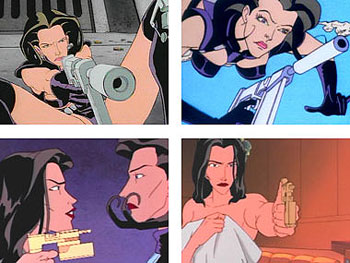Skating The Edge With Aeon Flux
Published on July 30th, 2011 in: Cartoons, Feminism, Issues, My Dream Is On The Screen, Science Fiction, TV, Underground/Cult, We Miss The Nineties |By Kai Shuart
At first blush, television seems a grossly distorted lens through which to examine philosophical questions. Every television show that comes through our tablets, computers, and (decreasingly) television sets is so overblown, and, well, downright Hollywood, how can it be the catalyst for examining the deeper questions of life? It’s entertainment; it’s only supposed to hang around between the time the opening credits start and the closing credits end.
But if one really pays attention to the pretty lights coming through the boob tube, one finds that just sometimes, there’s much more to television than meets the eye. Sometimes, when we pay close enough attention, great television asks us to consider some pretty heavy philosophical questions, such as identity, free will, and how far one should be willing to go in order to create a perfect world.

Take for example, Aeon Flux, the animated series created by Peter Chung. Its sexy, slam-bang Sci-Fi façade belies many complexities. The character Aeon acts as a secret agent between the rigid, orderly state of Bregna, and her home, the anarchistic state of Monica. She is pure mercenary; there is very little that stands in the way of accomplishing her goals. In the episode “Last Time for Everything,” she makes a clone of herself, and when she discovers that Scaphandra, a friend with whom she’d made many escapes, is acting as a double agent in collusion with Aeon’s lover/nemesis Trevor Goodchild, she instructs her own clone to kill Scaphandra. This would be difficult for anyone to do, yet the Aeon clone (imbued with all the thoughts and feelings of Aeon herself) executes the order without a thought. Yet beneath these seemingly calculated actions, Aeon’s motives are pure; she wants to bring down Trevor Goodchild, whom she sees as a tyrant, and usher in an era of true personal freedom.
Speaking of Trevor Goodchild, what about him? Like Aeon, in order to exert his will and mold a more perfect state, he resorts to dubious means. “Clean gloves hide dirty hands,” he says, “And mine are dirtier than most.” He is the totalitarian leader of Bregna, and he enforces his will with an iron fist, ruthlessly having rivals arrested. Yet it would seem on the surface that his are the much purer motives. He is a proponent of “new openness,” a transparency between people and government. He also touts that his rule will bring an end to shame, even as he holds Clavius, the rightfully elected ruler of Bregna, captive. When Gildemere, an idealist in Trevor’s camp, tries to rescue Clavius, believing that he’s been held prisoner as a result of Trevor’s coup d’état, it is discovered that Clavius has become a madman, completely detached from any semblance of reality. In this light, it is understandable that someone would want to keep Clavius locked up like the Man in the Iron Mask in order to keep the potential damage to a minimum.
Another instance where Aeon Flux seems to ask whether the ends could possibly justify the means is in the episode “The Purge.” In it, Trevor Goodchild boasts that he has constructed a Clockwork Orange-esque artificial conscience. When this artificial conscience is implanted, the patient has no choice but to behave in a way that is generally perceived as “good.” This begs the question: How much of someone’s behavior can we reconstruct before said person ceases to be an independent being?
Predictably, the artificial conscience has unforeseen effects. People start behaving so passively as to act against their own best interests. For instance, hardened criminal Bambara severs his own arm in order to give it to an armless child, which results in the child having an almost comically lopsided appearance, with a prepubescent boy’s arm on one side and an iron-pumping hardened criminal’s on the other.
Given that both of these characters are so hell-bent on exerting their will, it is no surprise that Aeon and Trevor share a mutual attraction. This attraction manifests itself in Trevor cloning multiple versions of Aeon and housing them in what can only be called a dollhouse, just to discover that they pale in comparison to the original that he seeks to possess. This again gets to the question of personal identity: Is our personhood found in our stride, our physical being, our effect on the world and our place in it, or is it something innate that makes us who we truly are?
For Aeon’s part, she is content to attempt domination of Trevor through destroying his perfectly ordered world. She acts as a perfect negative reflection. Where he has created order, she walks into Trevor’s stronghold and brazenly states her name and her mission to assassinate him. She even goes so far as to destroy a sterile ecosystem that Trevor has painstakingly preserved in fluid. This, of course, makes her all the more enticing to Trevor.
In the series’ last episode “End Sinister,” Aeon pushes a button that destroys an alien civilization which turns out to be a highly evolved form of humanity. Given all we know about them, is it any wonder than the final image of this unlikely pair is the both of them sleeping in what looks like an escape pod? When they get into the pod together, it is as though they are acknowledging their destiny (or karma, or fate, or what-have-you) to be each other’s lover/antagonist.
Shows such as Aeon Flux proved that big questions like the ones I’ve mentioned can be posed in the guise of cultural ephemera. When we think critically about it, television can be an excellent avenue through which we explore the deeper questions of what it means to be a human. It just takes a daring person at the helm to pose them correctly.
Time limit is exhausted. Please reload the CAPTCHA.